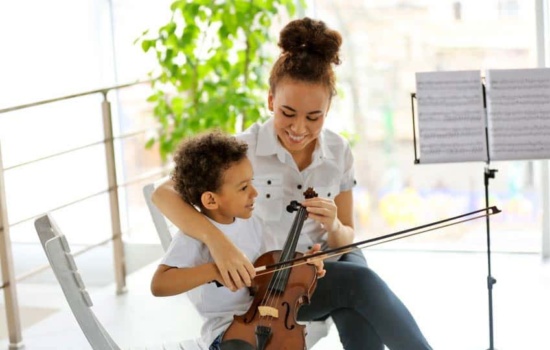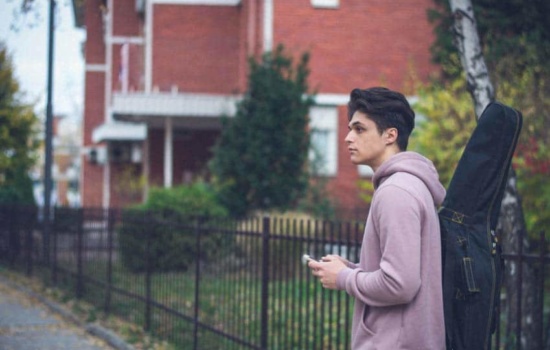Music Career Finder
Survey Start
Music Teacher
Career Overview
Music teachers instruct elementary, junior high, or high school students in vocal and instrumental performance and music theory. They also lead various performance ensembles at the school, such as the marching band, choir, jazz band, and orchestra.
Alternate Titles
Music Instructor
Avg. Salary
$71,4091
Salary Range
$58K-$105K per year1
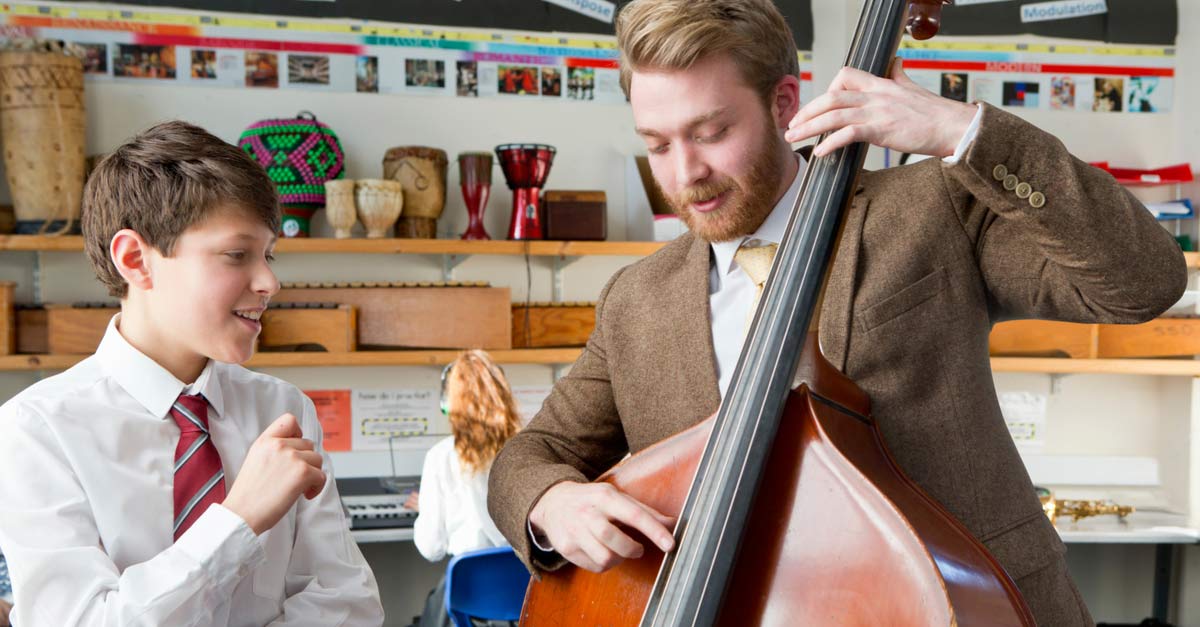
How To Become a Music Teacher
- Music teachers teach music to students in public and private schools
- You must be musically skilled, knowledgable in music theory, and be patient
- You will probably need to get certified before teaching
- Public school music teacher positions won’t pay as high as private school music teacher positions, but it can be harder to get into a private school position
- The average salary for a music teacher is about $71,409 and it ranges from $58,000 to $105,000 per year
- Career Description
- Salary
- Career Outlook
- Career Path
- Experience & Skills
- Education & Training
- Additional Resources
- Sources
- References
Career Description
Music teachers, or music instructors, teach music to students in public and private schools at the K-12 level.
What Does a Music Teacher Do?
Whether in public or private schools, music teachers are an important part of the education and music ecosystems. They have the opportunity to mold future musicians and music educators.
Here are the main responsibilities of a music teacher:
- Teach music to a classroom of kids
- Plan lessons
- Help conduct rehearsals for school performances
- Organize performances
- Evaluate student progress
- Maintain instruments and equipment
- Collaborate with teachers, the principal, and parents
Ashleigh Spatz, a music teacher and award-winning educator, said she also teaches other subjects, like art, physical education, Spanish, and she’s the lead teacher for all of the elementary music teachers in her district.
Music teachers are certified to teach other subjects too, so it’s common for them to take on other teaching responsibilities.
A Day In the Life of a Music Teacher
Kevin Brawley is a public school music teacher, children’s choir director, and private guitar teacher.
And he said a typical day for him looks like this:
- Arrive an hour early to school to prep and set out materials/instruments.
- Greet the kids while playing guitar as they come off the bus
- Teach morning classes (K-2nd)
- Teach afternoon classes (3rd-5th)
- At the end of the day, make sure the kids walk home with the correct parent
- Stay about 30 minutes after dismissal to review lessons, improve them, make adjustments for the next day
- Lead an after-school elective choir one day a week (4th-5th)
Salary
The average salary for a music teacher is about $71,409 but it can range from $58,000 to $105,000 per year1.
How Do Music Teachers Make Money?
If a music teacher is working for a public or private school, they are almost always an employee of that school.
There are situations where you could be hired as a freelance music teacher, but that’s more likely to be a part-time position.
Even full-time, employed music teachers supplement their income by teaching privately outside of their school responsibilities.
They may work in a private studio, a music store, or teach out of their home. Some Teachers also pursue part-time careers as performers, playing at weddings, bar mitzvahs, parties, nightclubs, and industry events.
Hey, what do you think about trying our new Music Career HelperMusic Career Helper really quick? It’s totally free and could help get your career moving fast! Give it a try. It’s totally free and you have nothing to lose.
Career Outlook
As long as schools need music teachers, this career will be in demand.
Career Opportunities
Demand for public school music teachers will be influenced by education budgets. Unfortunately, many school districts lack the funds they need for music, but there are consistent opportunities in districts that prioritize arts programs.
In this setting, you would benefit from a stable salary, benefits, and the chance to reach a diverse student population.
Opportunities in private schools are often tied to the institution’s financial resources, which is tied to the wealth of the surrounding area. If the school has an emphasis on arts education, that could result in smaller class sizes.
These positions will offer higher pay but there will be fewer job openings.
Teaching private one-on-one lessons offers flexibility and the potential for a lucrative income, particularly in areas with strong demand for music education.
Work-Life Balance
Brawley said that, with his teaching responsibilities plus being a choir director, he works at least 47.5 hours a week.
He, Hancock, and Spatz said they try to leave work at work. But work can often go past regular school hours.
“Teachers are salaried employees, which means you work until the job is adequately done,” Spatz said. “This can become a tricky issue with work/life balance as most music teachers are extremely passionate about their career and will pour everything into their job.”
Career Path
To become a music teacher, it will help you to have a background or a degree in music, even though it’s not always necessary. However, you will need to get your music teaching certificate, the process and requires of which differ among the states.
Here are the main paths you can take if you want to be a music teacher…
Public School Setting
On top of applying for public school music teacher positions, you could substitute teach at schools in your area. This will give you a chance to get to know the teachers and staff and show them you’re a trustworthy and hardworking person.
Private School Setting
There are fewer music teacher positions at private schools because the pay is typically higher than in public schools. So to go the private school route, you may need to network your way into a role.
Private Lessons
This path requires self-promotion, building a client base, and managing a less predictable income stream. This would usually be a self-employed position, whether in the client’s home, in your home studio, or at a local music school or music shop.
Experience & Skills
Here are the main skills you’ll need to succeed as a music teacher…
Musical Talent
First and foremost, music teachers must have superior musical skills. This means being accomplished on at least one instrument, sometimes more.
It’s important to know and understand how all the instruments work and be able to teach basic performance skills.
Singing
You don’t have to be an amazing singer, but you should be able to carry a tune. You’ll have to teach singing, so you need to be able to sing at least basic parts.
Sight-Reading Music
You will be expected to teach students how to read and write sheet music. So your knowledge and experience with sheet music needs to be solid.
Music Theory Knowledge
Music theory is at the heart of what you will be teaching, and you can’t teach something if you don’t first know it. So you have to know at least basic music theory.
Patience
You must be a skilled performer. But you also need to be a patient, inspiring teacher.
It’s important to have people skills and the ability to work with kids, teens, and young adults.
Education & Training
In most states, certification is required to teach in public schools, while private schools may not require state certification.
Music teachers may also teach in public schools as substitute teachers without being certified.
Music Teacher Degree
If you feel it’s best to earn a degree to further your music teaching career, your best options would be to study music education and/or music performance.
These university programs are designed to prepare you to get the required certification to start teaching. Since the certification process is at the state level, it makes sense to attend school in the state where you intend to teach.
You can also take elective courses in songwriting, guitar, piano, and other realted areas to help broaden your knowledge so you can better help your students.
After or during college, it would be a good idea to get an internship or an apprenticeship with a music teacher. This will give you a chance to apply all the methods and teaching techniques they’ve been learning in the real-world classroom.
Additional Resources
There are a huge variety of professional organizations and associations dedicated to teaching music, many of which have collegiate chapters so students can get immersed in the world of music education early.
Here are a few to check out:
- The American Choral Directors Association
- The NAFME (previously MENC)
- The Music Teachers National Association
- The College Music Society
- National Association of Teachers of Singing
- American String Teachers Association
- International Association for Jazz Education
- International Society for Music Education
Sources

Kevin Brawley
Kevin Brawley is an Educator, Children’s Choir Director, Public Speaker, and Professional Development Specialist from Charlotte, North Carolina. He has been a Public School Teacher for nine years in Charlotte-Mecklenburg Schools at Torrence Creek Elementary, and a private Guitar Teacher for nine years prior to that.
As a Teacher, Kevin believes in every child’s ability to learn regardless of circumstance or background. He prides himself on having an inclusive and positive learning environment for all of his students–especially those with disabilities. His energetic and unorthodox teaching style is focused on student engagement, a willingness to search for unexpected teaching moments, and honest personal relationships with each of his students, which make the rigorous concepts he teaches easy for them to get excited about.
As a speaker, Kevin has an energetic and uplifting presence and burns to see a revival in education. He is passionate about removing the limitations of what people believe is possible in a classroom. Where others may see obstacles, Kevin sees opportunity for innovation and an infusion of new ideas. He has spoken around the country about teaching students with autism and has been chosen to address the entire staff of Charlotte-Mecklenburg Schools at their back-to-school learning symposium. He has also spoken at business events and to undergraduate music education students at UNC-Charlotte.
In 2015, Kevin began planning to outfit his school with a professional-level recording studio. After being named one of only 30 National Music Teachers of Excellence by Nashville’s CMA Foundation in 2019, and with grants awarded locally by the CMS Foundation and other private donors–his dream became a reality in the spring of 2020. Kevin has received numerous awards and recognition for his work, including being named the UNC-Charlotte Young Alumni of the Year in 2019, and the UNC-Charlotte COAA Outstanding Alumni of the Year in 2020.
Currently, Kevin is writing his first book, The Sober Teacher, and is working to create an online home school music program to help parents give their students the same level of musical instruction and possibility available in his classroom.
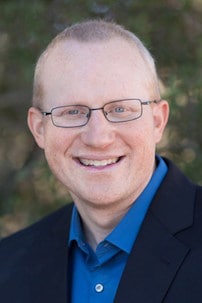
Keith Hancock
Keith Hancock is the Choral Music Teacher at Tesoro High School in Rancho Santa Margarita, CA, where he has taught for about a decade and a half. In 2017, Hancock won the GRAMMY Music Educator of the Year award.
He has been profiled in the The Orange County Register, CBS This Morning, Smart Music, Broadway World, UPI, Orange County Department of Education Newsroom, Billboard, National Federation of State High School Associations, PBS, GospelMusic.org, LA Times, Daily News, U Discover Music, Downbeat, and Variety.
You can also watch Keith Hancock interviewed live backstage at the 59th GRAMMYs and check out a congratulatory video from the National Education Association.
Hancock’s choirs have been invited to perform at the American Choral Directors Association’s Western Division conference twice. They have also performed in Spain, Germany, Austria, Switzerland, England, Ireland and Carnegie Hall in New York. His Madrigals group has journeyed to France, Germany, and Luxembourg.
He has taken three barbershop quartets to the championships in the Barbershop Harmony Society’s Youth Barbershop Quartet contest. Hancock is a Chapman University alum and a member of NAfME.
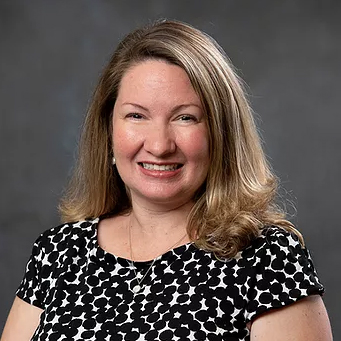
Ashleigh Spatz
Ashleigh Spatz has teaching in her bloodline. She was born into a family of Teachers who instilled in her a love of lifelong learning and a passion for using her talents to create positive change in society. Ms. Spatz started her career in Fulton County Schools where she honed her skills as a General Music Teacher and learned from the best. She now works for Atlanta Public Schools and has found her home at Burgess-Peterson Academy. She excels at creating a positive and challenging environment for her students who feel encouraged to take risks and let their talents shine.
Ms. Spatz has received several statewide and national awards including the Give-A-Note Music Innovator Award in 2020, the CMA Music Teacher of Excellence Award in 2019, and the Teach On Project Award in 2019. She has worked for the Georgia Department of Education to write curriculum and music education standards for the state. She has a passion for mentoring new Teachers and is not only a proud Teacher but also a proud mom to her four children, a fur baby, and 18 chickens.
References
- 1. "Music Teacher Salaries in United States". Glassdoor. published: June 6, 2024. retrieved on: Nov 20, 2024
